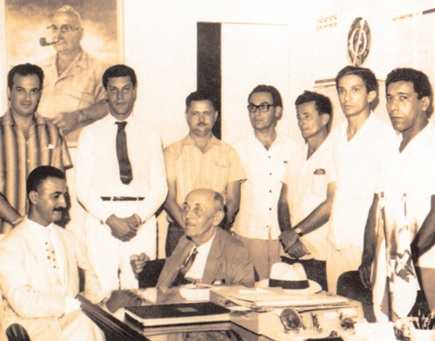Special 50 years – A History Focused on the Family
Check the first steps of the Odebrecht Foundation in 50 years of history
23 de April de 2015
Check the first steps of the Odebrecht Foundation in 50 years of history
23 de April de 2015

Emílio Odebrecht Foundation – Paying tribute to a great example
Norberto Odebrecht was six years old when he arrived with his family to Salvador, Bahia. At home, following the leadership of his mother, Hertha Odebrecht, he and his sisters were prepared for life and for work. His father, “Mr. Emílio,” as he was known, was a great educator: he spent many evenings at his home speaking to young engineers, foremen and workers, orienting them and answering their questions. In 1944, when Norberto needed to found an individual construction company, he received from his father the most important asset a company can have: people educated to serve. Twenty one years later, the foundation was created inspired by Mr. Emílio, who passed away in 1962, but whose legacy remained through his example.
First years – Support for members and their families
In 1965, the then Emílio Odebrecht Foundation (it was only in the 1990s that it came to be called the Odebrecht Foundation) was founded with the main mission of ensuring a pension fund with guaranteed retirement and generating benefits for members of Construtora Norberto Odebrecht and their families. It was not an easy mission – they were at construction sites located in the rural regions of Brazilian Northeast states, and years later, they were distributed throughout the country, in hard-to-access sites. The solution was to create Decentralized Units in the work environments. There, members received all of the assistance they needed: medical and dental care, literacy courses, libraries, conditions for home loans and leisure options for when they had time off, with games, movie sessions, excursions and other cultural activities. For the family, there was the guarantee of high quality health care.

From 1977 to 1978, Odebrecht doubled its number of members – from 10,000 to 20,000 – and the Foundation needed to increase the number of Decentralized Units at the construction sites. Starting with just four, these units grew to 19 and covered all points of Brazil where the company was present. As a consequence, there was a reduction in Members and their dependents received medical and dental care at the Decentralized Units the number of members on work leave, as well as in the labor turnover and number of accidents – gains for the member and the constructioncompany, due to its increased productivity.
In 2006, during an interview with the magazine Odebrecht Informa as part of the special edition to celebrate the foundation’s 40-year anniversary, Norberto Odebrecht summarized the institution’s commitment: “Even though we have undergone several transformations, there is a driving force, a guiding principle that is not always noticeable, but which has always been present,” he said. “I am talking about family, toward which, deep-down, we always direct our attention”.
Names that marked its history – The first decades

Sociologist Emilton Moreira Rosa was the first Chair of the Emílio Odebrecht Foundation Board of Trustees and remained there until 1981. For him, being chosen for this position was an honor and great challenge, considering that in the 1960s, foundations were rare in Brazil and few people knew how to organize them: “The foundation’s Chair would naturally be Dr. Norberto, but being the old friend he was, he decided to distinguish me with this honor,” said Rosa. “I traveled through Brazil visiting foundations to better understand how they worked,” he recalled.

A native of Ituberá, Bahia and one of the main people to continue with Emilio Odebrecht’s social work, attorney Barachisio Lisboa was a close friend of his son, Norberto. He played an important role at the foundation. Besides being one of the institution’s main supporters, he was also a board member. In 1976, when he was elected a trustee, he encouraged the recognition of men and women when reformulating the entity’s guidelines and statutes. “A company that is unable to create a joyful workplace will not achieve the same results as the one that has put men and women at the heart of all of its prosperity,” said Lisboa
Do you wish to be
a partner in our projects, make
a donation or hire our technical consulting?
Send a message
right now!